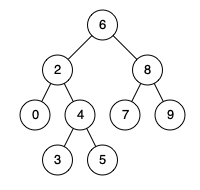- Lowest Common Ancestor of a Binary Search Tree
Given a binary search tree (BST), find the lowest common ancestor (LCA) node of two given nodes in the BST.
According to the definition of LCA on Wikipedia: “The lowest common ancestor is defined between two nodes p and q as the lowest node in T that has both p and q as descendants (where we allow a node to be a descendant of itself).”
Example 1:
**Input:** root = [6,2,8,0,4,7,9,null,null,3,5], p = 2, q = 8
**Output:** 6
**Explanation:** The LCA of nodes 2 and 8 is 6.
Example 2:
**Input:** root = [6,2,8,0,4,7,9,null,null,3,5], p = 2, q = 4
**Output:** 2
**Explanation:** The LCA of nodes 2 and 4 is 2, since a node can be a descendant of itself according to the LCA definition.
Example 3:
**Input:** root = [2,1], p = 2, q = 1
**Output:** 2
Constraints:
- The number of nodes in the tree is in the range
[2, 10^5]. -10^9 <= Node.val <= 10^9- All
Node.valare unique. p != qpandqwill exist in the BST.
Idea
递归思路:
根据二叉查找树的定义:左子树的子树的所有节点值都小于根节点,右子树的所有节点值都大于根节点
* 如果p,q节点值都比当前节点都小,则说明p,q 都在当前节点的左子树中
* 如果p,q节点值都比当前节点都大,则说明p,q都在当前节点的右子树中
* 如果p,q当中任意一个节点值等于当前节点,则说明当前节点即为p,q公共最近祖先
JavaScript Solution
/**
* Definition for a binary tree node.
* function TreeNode(val) {
* this.val = val;
* this.left = this.right = null;
* }
*/
/**
* @param {TreeNode} root
* @param {TreeNode} p
* @param {TreeNode} q
* @return {TreeNode}
*/
var lowestCommonAncestor = function(root, p, q) {
if( root.val > p.val && root.val > q.val ){
return lowestCommonAncestor(root.left, p, q)
}
if( root.val < p.val && root.val < q.val ){
return lowestCommonAncestor(root.right, p, q)
}
return root;
};
